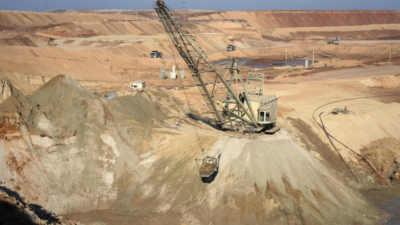- News
- Science News
- Which minerals are found in Ukraine and what are they used for
Which minerals are found in Ukraine and what are they used for
Ukraine and the United States have reached an initial understanding on a minerals deal, paving the way for an economic partnership agreement and an investment fund for Ukraine's reconstruction. Ukraine holds significant reserves of critical minerals like graphite, titanium, and uranium, essential for various industries including renewable energy, aerospace, and defence.
Ukrainian government has announced that it has reached an initial understanding with the United States on a potential minerals deal. According to Economy Minister Yulia Svyrydenko, a memorandum of intent has been signed, laying the foundation for a forthcoming “economic partnership agreement” between the two nations. She noted that the finalised deal would also establish an investment fund to aid in Ukraine’s reconstruction.
Ukraine is a treasure trove of minerals critical to the modern global economy. With vast and diverse underground resources, the country plays a strategic role in the supply chains of industries ranging from aerospace and defence to renewable energy and electronics.
Graphite, Titanium, and other minerals found in Ukraine
Ukraine is home to over 20 types of critical minerals, making it one of the most resource-rich countries in Europe. These minerals are not only essential for conventional manufacturing but also form the backbone of emerging technologies such as electric vehicles (EVs), solar panels, and advanced military equipment.
Graphite
Among its most valuable assets is graphite, with Ukraine holding around 20% of the world's reserves. Graphite is vital for producing lithium-ion batteries, which power EVs, smartphones, and other electronics.
It is also used in lubricants, brake linings, and steel manufacturing due to its high thermal resistance. With the rise of clean energy, demand for graphite is expected to surge in the coming years.
Titanium
The country also has significant titanium reserves, accounting for roughly 7% of the global supply. Titanium is lightweight, durable, and resistant to corrosion, making it indispensable in aerospace, medical implants, and high-performance sports equipment.
It is also used in military aircraft, submarines, and armour plating. Ukraine’s titanium industry holds strategic value for both defence and commercial industries across the globe.
Uranium
Ukraine’s uranium reserves, estimated to make up 2% of the global supply, support its nuclear energy infrastructure. The country also ranks highly in iron ore, manganese, nickel, and copper, all of which are crucial for construction, infrastructure, and electronics manufacturing.
Rare and strategic elements
Ukraine’s mineral wealth also includes lithium, a key component of rechargeable batteries. Although the exact percentage of global lithium reserves in Ukraine is still being assessed, early surveys indicate that the country could become a major player in the global battery market.
In addition, gallium, zirconium, and beryllium — all used in high-tech and defence industries — are found in meaningful quantities. Gallium, for example, is used in semiconductors, solar panels, and LEDs, while beryllium is prized for its strength and lightweight properties in aerospace and military applications.
Other important minerals
Other minerals include kaolin (used in ceramics and paper), peat (used for energy and agriculture), and apatite (important for fertilisers). Even silver, zinc, lead, and magnesium feature among its lesser-known but economically important resources.
Strategic importance and future partnerships
As global demand for critical minerals grows, especially due to the green energy transition, Ukraine’s reserves have gained attention from key international players. The recent preliminary agreement between Ukraine and the United States on a minerals deal is a clear indicator of the country's growing relevance in this sector.
For Ukraine, these resources represent not only a pathway to post-war recovery but also an opportunity to strengthen its international partnerships and secure a central role in the industries of the future.

About the Author
TOI Science DeskEnd of Article
Follow Us On Social Media

